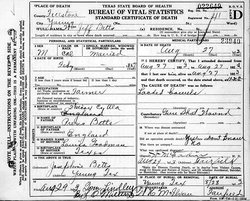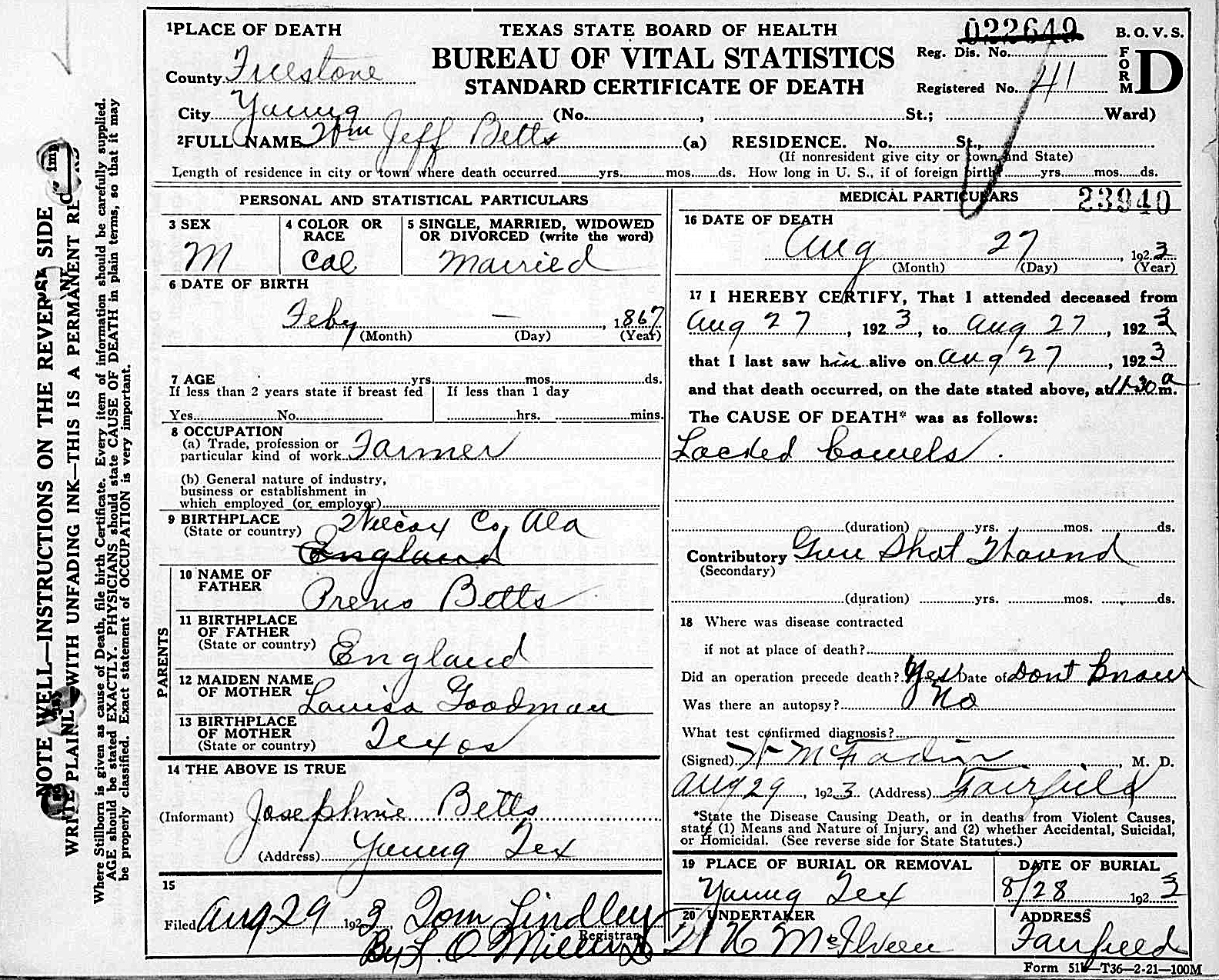From Freestone County Archives:
http://files.usgwarchives.net/tx/freestone/reflect/titus/betts.txt
Spotlight Upon Unsung Heroes
William Jefferson Betts:
Freestone County Trailblazer
By Wilbur Thirkield Titus
Even though I never knew him in person, memories of William Jefferson (Jeff) Betts will be forever emblazoned upon my memory because of the kind of man that he was and the achievements that he made. He was an ex-slave who lived during the reconstruction period following the Civil War. My parents and grandparents often spoke of him, his accomplishments and of the contributions that he made to the life of Freestone County, Texas.
Writing in The History of Freestone Co., Vol. 1, McDuffe Betts, grandson of William Jefferson Betts, states that William Jefferson Betts was born a slave of the John Watson Family in Alabama. Following Emancipation, the Betts slaves
remained on the plantation of the Watsons and continued to work for them. When the John Watson Family migrated to Texas in the early 1850s, the ex-slaves were left behind. Nevertheless, in the late 1850s Alexander Taswell Watson made it possible for twenty or more ex-slaves to come and work on his large farming enterprise in the Stewards Mill Community of Freestone County, Texas. The following Betts were members of the group: Jeff and his wife Josephine, Frank and Annie, Jim and Minnie, and Earnest and Louise Betts.
Because of his leadership ability, dependability, and his ability to get things done, Jeff was made overseer of the Tas Watson farming enterprise. He saw that the wishes of Mr. Watson were obeyed and that the needs of the other workers were met according to the wishes of Mr. Watson.
He was industrious, reliable, and a good manager. Not only was he Mr. Watson's "right hand," he was able to deal in real estate for himself. He is reported to have owned more than 350 acres of land, which was no small fete for anyone
during those times. This made him economically secure and able to help his relatives and friends.
Jeff was a leader in the communities where he had interests. He was an astute businessman and a generous benefactor. When my grandfather, Reverend Eldridge
Hunter, bought 50 acres from him, Jeff arranged for grandpa's family to pick cotton to pay for it.
He had facilities for producing and storing food, and used his connections to help provide homes for his many children and relatives. He and his family were active in the Hope Well Methodist Church and Mt. Zion Baptist Church in the
Brown's Creek Community. He was also an active member of the local Masonic Lodge, which was composed of the leaders of the African American men of the area.
William Jefferson Betts was an ex-slave who lived during difficult times, under conditions that were not always favorable. He was able to negotiate the system with dignity, and made significant contribution to society. He died in 1923 andwas buried in Hope Well Cemetery, Fairfield, Texas. Hats off to William Jefferson Betts!
For additional information, see The History of Freestone County, Vol. I.
From Freestone County Archives:
http://files.usgwarchives.net/tx/freestone/reflect/titus/betts.txt
Spotlight Upon Unsung Heroes
William Jefferson Betts:
Freestone County Trailblazer
By Wilbur Thirkield Titus
Even though I never knew him in person, memories of William Jefferson (Jeff) Betts will be forever emblazoned upon my memory because of the kind of man that he was and the achievements that he made. He was an ex-slave who lived during the reconstruction period following the Civil War. My parents and grandparents often spoke of him, his accomplishments and of the contributions that he made to the life of Freestone County, Texas.
Writing in The History of Freestone Co., Vol. 1, McDuffe Betts, grandson of William Jefferson Betts, states that William Jefferson Betts was born a slave of the John Watson Family in Alabama. Following Emancipation, the Betts slaves
remained on the plantation of the Watsons and continued to work for them. When the John Watson Family migrated to Texas in the early 1850s, the ex-slaves were left behind. Nevertheless, in the late 1850s Alexander Taswell Watson made it possible for twenty or more ex-slaves to come and work on his large farming enterprise in the Stewards Mill Community of Freestone County, Texas. The following Betts were members of the group: Jeff and his wife Josephine, Frank and Annie, Jim and Minnie, and Earnest and Louise Betts.
Because of his leadership ability, dependability, and his ability to get things done, Jeff was made overseer of the Tas Watson farming enterprise. He saw that the wishes of Mr. Watson were obeyed and that the needs of the other workers were met according to the wishes of Mr. Watson.
He was industrious, reliable, and a good manager. Not only was he Mr. Watson's "right hand," he was able to deal in real estate for himself. He is reported to have owned more than 350 acres of land, which was no small fete for anyone
during those times. This made him economically secure and able to help his relatives and friends.
Jeff was a leader in the communities where he had interests. He was an astute businessman and a generous benefactor. When my grandfather, Reverend Eldridge
Hunter, bought 50 acres from him, Jeff arranged for grandpa's family to pick cotton to pay for it.
He had facilities for producing and storing food, and used his connections to help provide homes for his many children and relatives. He and his family were active in the Hope Well Methodist Church and Mt. Zion Baptist Church in the
Brown's Creek Community. He was also an active member of the local Masonic Lodge, which was composed of the leaders of the African American men of the area.
William Jefferson Betts was an ex-slave who lived during difficult times, under conditions that were not always favorable. He was able to negotiate the system with dignity, and made significant contribution to society. He died in 1923 andwas buried in Hope Well Cemetery, Fairfield, Texas. Hats off to William Jefferson Betts!
For additional information, see The History of Freestone County, Vol. I.
Gravesite Details
UNMARKED GRAVE
Sponsored by Ancestry
Advertisement
Explore more
Sponsored by Ancestry
Advertisement


